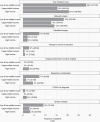Variation in postoperative outcomes of patients with intracranial tumors: insights from a prospective international cohort study during the COVID-19 pandemic
- PMID: 37052643
- PMCID: PMC10326494
- DOI: 10.1093/neuonc/noad019
Variation in postoperative outcomes of patients with intracranial tumors: insights from a prospective international cohort study during the COVID-19 pandemic
Erratum in
-
Corrigendum to: Variation in postoperative outcomes of patients with intracranial tumors: insights from a prospective international cohort study during the COVID-19 pandemic.Neuro Oncol. 2023 Sep 5;25(9):1729. doi: 10.1093/neuonc/noad120. Neuro Oncol. 2023. PMID: 37435884 Free PMC article. No abstract available.
Abstract
Background: This study assessed the international variation in surgical neuro-oncology practice and 30-day outcomes of patients who had surgery for an intracranial tumor during the COVID-19 pandemic.
Methods: We prospectively included adults aged ≥18 years who underwent surgery for a malignant or benign intracranial tumor across 55 international hospitals from 26 countries. Each participating hospital recorded cases for 3 consecutive months from the start of the pandemic. We categorized patients' location by World Bank income groups (high [HIC], upper-middle [UMIC], and low- and lower-middle [LLMIC]). Main outcomes were a change from routine management, SARS-CoV-2 infection, and 30-day mortality. We used a Bayesian multilevel logistic regression stratified by hospitals and adjusted for key confounders to estimate the association between income groups and mortality.
Results: Among 1016 patients, the number of patients in each income group was 765 (75.3%) in HIC, 142 (14.0%) in UMIC, and 109 (10.7%) in LLMIC. The management of 200 (19.8%) patients changed from usual care, most commonly delayed surgery. Within 30 days after surgery, 14 (1.4%) patients had a COVID-19 diagnosis and 39 (3.8%) patients died. In the multivariable model, LLMIC was associated with increased mortality (odds ratio 2.83, 95% credible interval 1.37-5.74) compared to HIC.
Conclusions: The first wave of the pandemic had a significant impact on surgical decision-making. While the incidence of SARS-CoV-2 infection within 30 days after surgery was low, there was a disparity in mortality between countries and this warrants further examination to identify any modifiable factors.
Keywords: collaborative research; global neurosurgery; neuro-oncology.
© The Author(s) 2023. Published by Oxford University Press on behalf of the Society for Neuro-Oncology.
Conflict of interest statement
All authors declare no conflict of interest.
Figures


References
-
- Lai AG, Pasea L, Banerjee A, et al. . Estimated impact of the COVID-19 pandemic on cancer services and excess 1-year mortality in people with cancer and multimorbidity: near real-time data on cancer care, cancer deaths and a population-based cohort study. BMJ Open. 2020;10(11):e043828e043828. - PMC - PubMed

